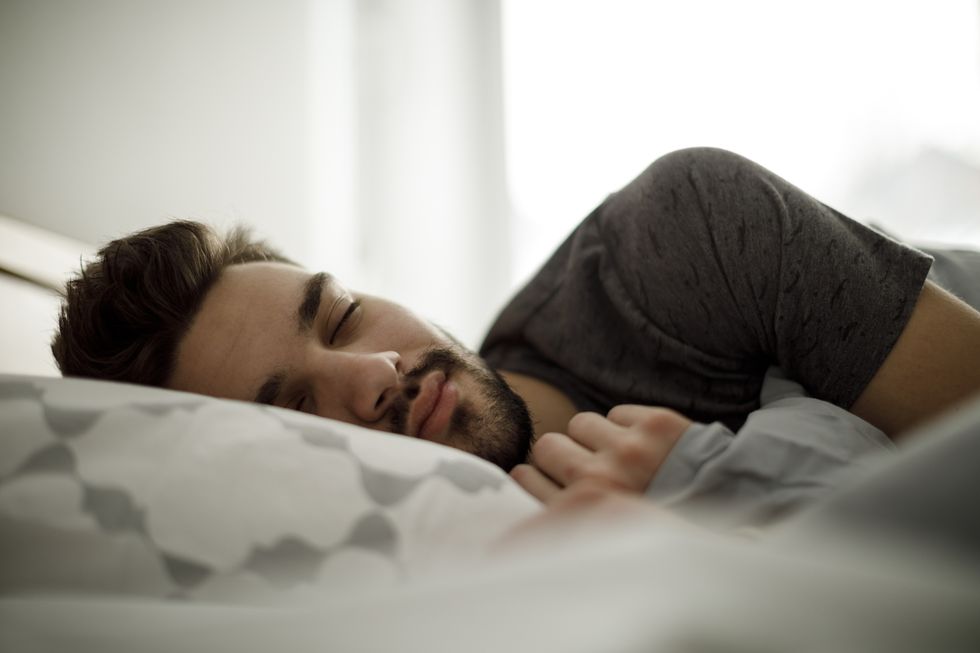You may not think of your time sleeping as an exercise in calorie-burning, but the truth is your body is always burning some no matter what you are doing—and that includes being sprawled out across your bed sleeping. To be clear, the calorie burn is minimal— approximately 40 to 55 calories per hour, and there are several factors that come into play with that number, including how much you weigh. So while it won’t rival your latest HIIT or powerlifting workout, it could net you a nice couple hundred or more, if you are sleeping for at least the minimum number of recommended hours, which the CDC says is about seven.
What determines how many calories you burn while sleeping
Ever heard of resting metabolic rate? It’s the number of calories an individual burns while at rest. “It is essentially the minimum energy required for essential physiological functions keeping us alive,” explains Alex Rothstein, CSCS, coordinator and instructor for the Exercise Science Program at New York Institute of Technology.
“When we sleep, we are the most at rest, so our caloric expenditure is based on this,” he goes on, noting that the factors that influence our caloric expenditure are based on things that affect our metabolism. Those things include the amount of lean body mass you have, whether you worked out that day, and what type of food you eat.
Sleep affects weight in more ways than just nighttime calorie burn
While you are burning calories during sleep, there are other important ways that sleep affects what you weigh. When it comes to keeping the pounds in check, both the quality and quantity of your sleep are important.
A constant lack of Zs wreaks havoc on your hunger hormones, upping the amount of the appetite-stimulating ghrelin and decreasing the appetite-suppressing leptin in the body. “Consuming calories is one compensatory mechanism for an under slept individual,” says MH advisor W. Chris Winter, MD, a neurologist and sleep specialist, and author of sleep books including The Rested Child. In other words, you’re prone to eating more. Not only that, but after just one sleepless night, research reveals that you’re also prone to specifically eating more calorie-dense and high-fat foods.
Sleep affects other weight-regulating hormones as well. “Yes, sleep deprivation, even short term, can result in insulin and glucose imbalances,” says Kuljeet (Kelly) Gill, MD, a sleep medicine specialist at Northwestern Medicine Central DuPage Hospital. Lack of sleep can also affect how balanced cortisol and your thyroid hormones are.
Sleep also affects your workout, which could affect your weight
A good night’s rest is critical to all physiological functions, and not getting the right amount can really be detrimental. When it comes to a workout specifically, sleep “influences everything from how you perceive your workout, how tired it is making you, or how focused you are on form, to how much endurance and strength you have,” explains Rothstein. “It then influences how well you recover from the workout in order to adapt and come back stronger and more resilient.”
With all the ways a negative night of slumber can affect you, it’s a must to snooze well. Things like setting a sleep schedule, having a nightly routine (try downloading the Peloton, Calm, Ten Percent Happier or Headspace apps and doing a quickie bedtime meditation); not watching TV in bed and making your room as comfy and cool as possible—you want your room to be about 65 degrees—can all help.
Rozalynn S. Frazier
Rozalynn S Frazier is an award-winning, multimedia journalist, and certified personal trainer living in New York City.
This content is created and maintained by a third party, and imported onto this page to help users provide their email addresses. You may be able to find more information about this and similar content at piano.io
